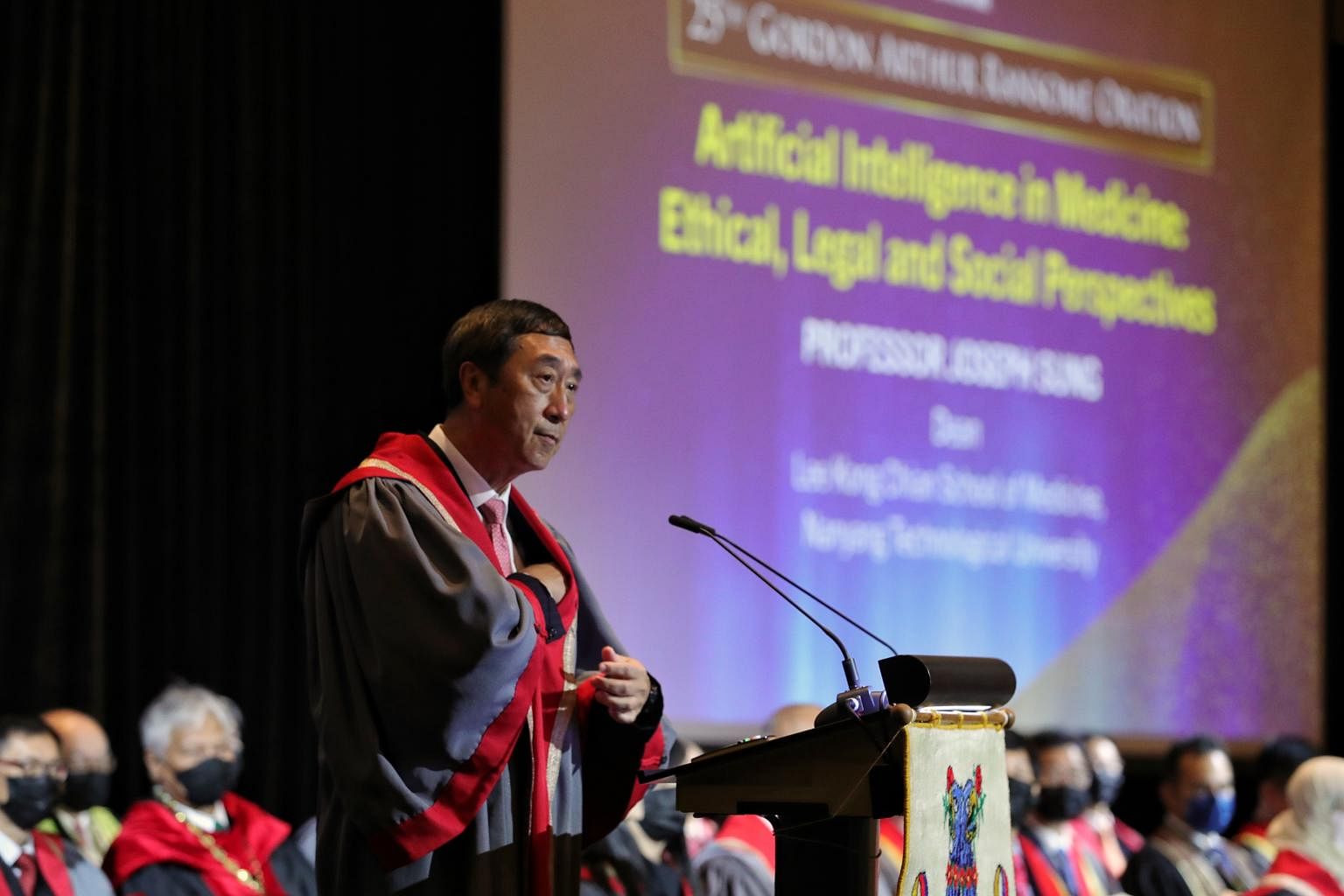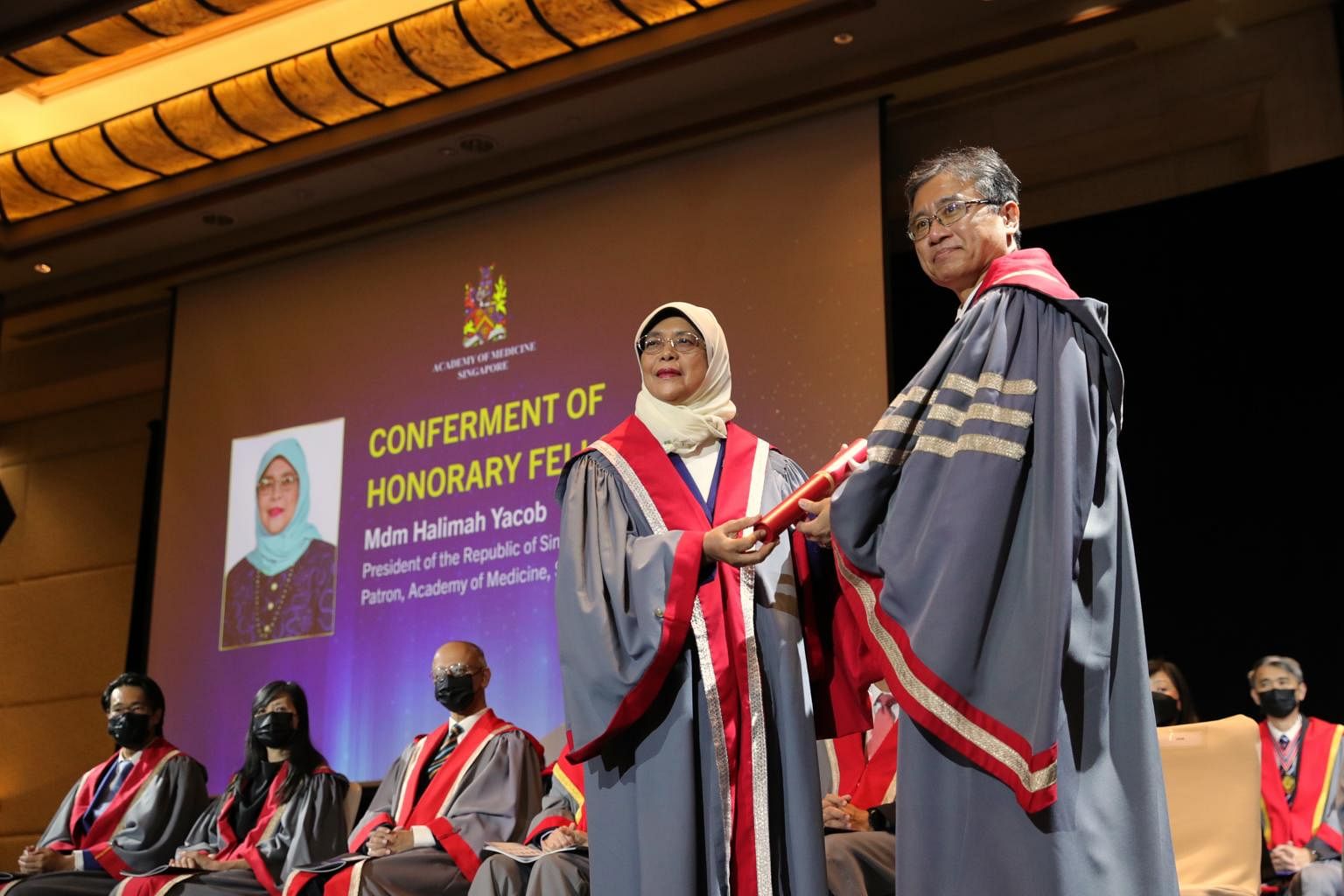Use of AI in medicine raises ethical, legal issues: NTU medical school dean
Sign up now: Get ST's newsletters delivered to your inbox

Professor Joseph Sung delivering a speech during the 4th AMM-AMS-HKAM Tripartite Congress and 55th Singapore-Malaysia Congress of Medicine, on July 23, 2022.
ST PHOTO: KEVIN LIM
Follow topic:
SINGAPORE - Artificial intelligence (AI) and robotics have led to some advancements in medicine, such as faster and more accurate diagnostic tools.
But there are many ethical and legal issues that need to be resolved before these technologies can be implemented in the field more widely, said Professor Joseph Sung, dean of the Lee Kong Chian School of Medicine at the Nanyang Technological University, on Saturday (July 23).
These ethical and legal issues include how to ensure patients' personal data is used in a way that respects their privacy, and who should bear responsibility for mishaps or mistreatment due to use of AI-enabled tools.
"If we don't know how to use technology in the appropriate way, we will be taken over and this will lead humankind to disaster," he said at the Grand Copthorne Waterfront Hotel during the annual induction ceremony of the Academy of Medicine, Singapore (AMS).
During the ceremony, the AMS conferred the title of Honorary Fellow on President Halimah Yacob in recognition of her contributions to Singapore and the academy, where she serves as its patron.
Madam Halimah also witnessed the induction of 105 new fellows of the academy.
In his speech, Prof Sung noted how AI and robotics have permeated into many aspects of life, including the field of medicine, where they have impacted clinicians and healthcare providers, the healthcare system itself, and the community.
For instance, image-based AI tools for diagnosis are used in many clinical specialities, Prof Sung said.
He added that these tools can tell if a growth is a malignant or benign lesion, predict the prognosis, and factors such as whether or not the patient is likely to respond to chemotherapy or other treatments.
"Artificial intelligence can help us to improve efficiency and allocation of resources because they can predict the major burdens of healthcare and the outcome of individuals who have cancer, diabetes or other chronic illnesses," Prof Sung said.
"This is very important for policymakers to decide where the healthcare resources should be allocated."
These technologies can also improve personal care, empowering patients to take care of themselves using wearable devices, for example, and see a doctor when there are abnormalities detected.
But despite breakthroughs in AI and robotics, the adoption of solutions based on these technologies is slow, Prof Sung noted.
Data privacy is one concern, Prof Sung said, noting that more private and personal data about people's health, biology and lifestyles is being generated than ever before.

President Halimah Yacob being conferred an honorary fellowship by Professor Teo Eng Kiong.
ST PHOTO: KEVIN LIM
"We have this ocean of data, but we really don't have the security and the sense of confidence that the data are used properly."
And there is still a lot of scepticism among patients about whether AI and machines can or should make life-and-death decisions.
Advances in AI and machine learning may lead to algorithms and recommendations may be beyond human comprehension, Prof Sung said.
"Without a biological explanation, and without understanding of the underlying rationale of these decisions, trust could be a problem," he added.
"Can we trust a black box? That is the machine learning in our healthcare decision. So transparency and interpretability of the machine learning system or deep learning system in healthcare are very, very important."

Professor Joseph Sung delivering a speech on the topic 'Artificial Intelligence in Medicine: Ethical, Legal and Social Perspectives'.
ST PHOTO: KEVIN LIM
Prof Sung drew a comparison with the debate on self-driving cars, which are also powered by AI.
"When the machine takes over the control, the responsibility should be gradually taken away from the driver.
"If you take this as a model, then our healthcare decisions and our surgery, we may also be moving... from a fully doctor-driven treatment, like surgeons operating on a tumour, to a fully robot-driven decision and a robot doing surgery. There will be a lot of discussion about how to apportion the responsibility."
Prof Sung delivered his lecture, titled Artificial Intelligence In Medicine: Ethical, Legal And Social Perspectives, as the 25th Gordon Arthur Ransome Orator.
The lecture series was created in 1970 to honour Professor Gordon Arthur Ransome, a pioneer in medicine in Singapore and the late founder and first master of the AMS.
About 400 medical and dental specialists and guests attended the event in person, including the Singapore’s Director of Medical Services Kenneth Mak. Several hundred other guests attended the event on Zoom.

